| Irish Forums Message Discussion :: Pitchfork Murders British army murders of Irish and cover up |
   | Irish Forums :: The Irish Message
Forums About Ireland and the Irish Community, For the Irish home and Abroad. Forums include- Irish Music, Irish History, The Irish Diaspora, Irish Culture, Irish Sports, Astrology, Mystic, Irish Ancestry, Genealogy, Irish Travel, Irish Reunited and Craic
|  
|
Pitchfork Murders British army murders of Irish and cover up
 

|
|
|
| Irish
Author |
Pitchfork Murders British army murders of Irish and cover up Sceala Irish Craic Forum Irish Message |
|
Irish Tim Brazil
Sceala Philosopher
Location: Recife Brazil
|
| Sceala Irish Craic Forum Discussion:
Pitchfork Murders British army murders of Irish and cover up
|
|
|
Here you go, details about the British army Pitchfork killings, part of the
Westminster Crown inspired British Terrorist murders & bombings in Ireland
Who were the Pitchfork Murderers and members of the British army
The extremely violent Murderers of innocent Irish people
Staff Sergeant Stanley Alexander Hathaway
Sergeant John mcfadyen Byrne
Accomplice in horrtific murder of innocent Irish people
Lance Corporal Iain Fletcher Chestnut
Withholding information (for years) of the horrific murder of Irish people
A supposed British army 'officer'
Captain Andrew Malcolm Burlton Snowball

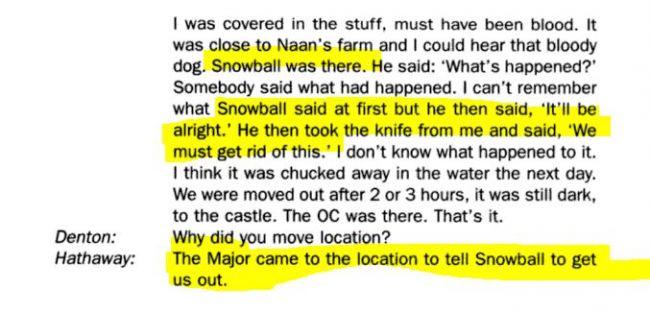
To be honest, I never knew any of this before googling, but then no surprise as I am part of the South that was kept in the dark by perverse supposed Irish politicians, the sort who made certain we never knew what was happening to Irish people in the North.
Conor Cruise O'Brien section 31, made democracy void
Bad dishonest People like that made sure peace was delayed, he not only approved of torture but actually delayed the peace process, he actually encouraged violence.
When people are denied a voice, what choice do they have!
Clearly some politicians in Ireland were not just content to promote the British convenient story of the 'Irish problem' being a sectarian infight, they made sure no one could be the wiser as to what was going on against Irish people.
We now all know that cruise was a traitor all along, a unionist sop who may as well have been planted in Irish govt by the British crown.
But did he manage to influence others because they were collectively scared to stand up for Irish people, or were they collectively that ignorant?
Pitchfork Murders British army murders of Irish and cover up
A former British soldier reflecting on The 'Pitchfork Murders' also reveals the widespread brutality and terrorism of the British army in the 'Troubles'.
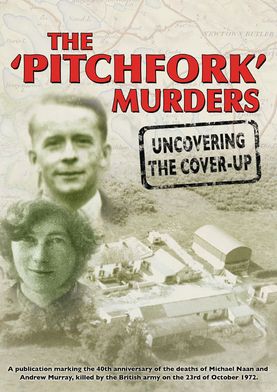
The public testimony of former British soldier.
While serving tours of duty, most soldiers preferred to turn a blind eye to the obvious brutality that often went hand-in-glove with British rule. Sometimes, however, veterans in civvy street felt compelled by circumstances to tell about state-violence they had taken part in, or witnessed. In 1978, a the north of Ireland veteran attended a Troops Out Movement public meeting in Bristol and stated:
When soldiers are on rifle ranges in Germany or England, it is normal practice to keep a couple of clips of ammunition for the paddies. This is illegal, but the NCOs turn a blind eye. These spare rounds can be used to replace any used rounds in Ireland when on patrol. Baton rounds are doctored with bits of metal and razor blades to cause even worse injury. Uniformed patrols hang around school gates for the aggro...
Most soldiers are not sadists when they join up. Most are unemployed lads attracted by three cooked meals a day and the adventure. Soldiers have no rights. The officers come from a different class. Constant drill orders and brainwashing, coupled with constantly carrying a loaded rifle, leads to frustration. This comes out in the violent behaviour in the ghettos of Ireland.
Another veteran was responsible for bringing to justice the perpetrators of one of the most brutal murder cases of the troubles'. In 1972 two Irish men, 31-year-old Michael Naan and 23-year-old Andrew Murray, had been found murdered at isolated farm buildings in County Fermanagh. Murray had been stabbed 13 times and Naan 19 times through the heart and chest. Michael Naan had been a prominent member of the Civil Rights Association and had taken part in a number of protest marches. The pathologist said Naan's wounds were 'consistent with an attack by someone who had gone berserk'. A sectarian motive was attributed to the killings and loyalists were suspected of carrying out the crime - that became known as the 'pitchfork murders', after the supposed murder weapon.
Later in the 1970s Britain was horrified by a series of brutal murders of young women, many picked up from 'red light' areas in northern cities. Reading about the latest 'Yorkshire Ripper' murder in 1978 had a profound affect on a Scottish ex-soldier.
The lurid accounts of the multiple stabbings of the latest victim had evoked memories of a night, six years before, when he had been a member of an army patrol in County Fermanagh.
The veteran knew who had really carried out those killings of Naan and Murray in 1972 and the similarity between those and the Yorkshire Ripper murders began to prey on his mind. Convinced that the killings must have been carried out by the same people, he went to the police and gave them full details of those killings in Ireland.
In reality there was no link between the two crimes. But the police were under intense public pressure to catch the 'Ripper', so began to investigate the ex-soldier's allegations.
In 1980, two former compatriots of the ex-soldier, a staff-sergeant and a sergeant, were tried and jailed for life for the murder of the two farm workers. When the staff-sergeant confessed to the police he broke down in tears and said: 'I did it. I did the killings. I killed them and they just wouldn't stop screaming. Oh my god - I have been having bloody nightmares about it'.
Other members of the patrol, including the officer in charge, received lesser sentences for aiding and abetting or withholding information. It come out during the trial that the murder weapon was not a pitchfork as first thought, but the stabbings were in fact carried out with a bowie knife which one of the soldiers possessed. It subsequently emerged that many of the troops in Ireland carried 'personal weapons', to which those in authority turned a blind eye.
Statement made by an ex-soldier
at a public meeting in Bristol in June 1978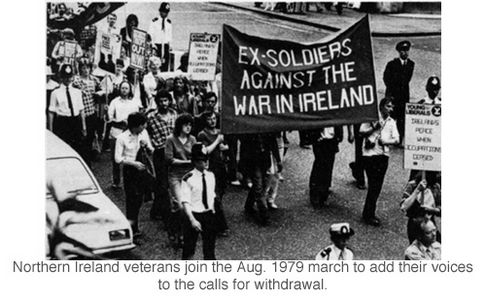
Who were the Pitchfork Murderers and members of the British army
Extremely violent Murderers of Irish people
Staff Sergeant Stanley Alexander Hathaway
Sergeant John mcfadyen Byrne
Accomplice in murder of Irish people
Lance Corporal Iain Chestnut
Withholding information (for years) of the murder of Irish people
A supposed British army 'officer'
Captain Andrew Malcolm Burlton Snowball
Do you reckon he mentions this on his linkedin summary!
British justice was as usual most selective! along with the British army it clearly thinks it was fine for a senior British army officer to withhold information about the violent murders of civilians by those they were in charge of.
Captain Andrew Snowball
HC Deb 17 February 1981 vol 999 c97W 97W
' 11. Mr. Fitt
asked the Secretary of State for Defence whether, in view of his conviction on a charge of withholding information relating to murder, Captain Andrew Snowball will be permitted to retain his commission.
' Mr. Goodhart
This is a matter for decision by the Army Board of the Defence Council, which awaits the submission of a case through the normal chain of military command. A decision will be made as soon as the usual procedures allow.
Do you think this Captain Andrew Malcolm Snowball served even a single day for his withholding information of these murders?
What sentence do you imagine the so called British justice would have handed down to anyone Irish who was withholding information on murders of British people, even if they had no actual evidence on them like the Birmingham six
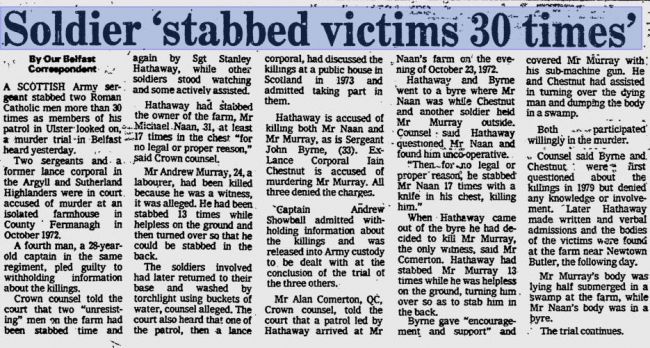
In 1981 after members of the Argyll and Sutherland Highlanders regiment were convicted of the murder of two Irish farmers in the north of Ireland (Pitchfork Murders), veterans of the Aden conflict came forward in the Scottish media to admit to atrocities they had seen or participated in. Wounded prisoners had been murdered by morphine injection and a teenager caught out after curfew had been bayoneted to death on the orders of an officer. (Despite there being no curfew order).
Unarmed Arabs were killed out of hand regardless of the Yellow Card instructions which laid out the circumstances in which soldiers could open fire. To detain an Arab, soldiers were taught to shout 'waqaf ' - pronounced 'wakeef ' - meaning halt. If three warnings were ignored soldiers were then entitled to shoot, but some treated this as a joke and shouted '*naughty word used* off' or 'corned beef' instead. Not surprisingly, most Arabs did not understand this and several were just gunned down.
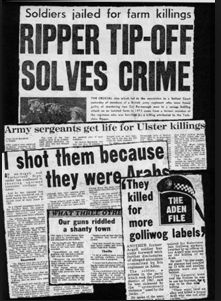
There were admissions also that the Argylls had been guilty of widespread looting. The Argylls used the Chartered Bank building in the Crater as their headquarters and snipers stationed on its roof would shoot at anyone thought to represent a threat in the streets below. A BBC journalist wrote "once we stood together in Crater watching the Argylls stacking, as in a butcher's shop, the bodies of four Arab "militants" they had just shot and Lt-Col. Colin Mitchell said: 'It was like shooting grouse, a brace here and a brace there'."
Remember though according to the BBC and ITV and SKY, the British army are all heroes, so buy your poppy to pay the welfare of the heroic murderers among them!
Buy a British Poppy help pay welfare of British army criminal offenders
It is not at all fascist to believe that all your side are heroes and the other savages.
You must all wear poppies and join in those who threaten the.
Irishman who refused to bow to British Poppy Fascism
Those who were veterans of colonial conflicts were schooled in aggressive counter-insurgency tactics. Some of the Argyll and Sutherland Highlanders had served with Lt Col Colin Mitchell, AKA Mad Mitch, who, in July 1967, marched his men into the Crater area of Aden (from where they'd been driven by insurgents) as 15 regimental pipers played Scotland the Brave. The strong-arm methods he used to keep the peace there were so notorious one offical referred to the regiment as "those Glasgow thugs."
After two sergeants from the Argylls, John Byrne and Stanley Hathaway, were found guilty of murdering two Irish men, Michael Naan and Andrew Murray, on a farm at Newtonbutler, in 1972, a former comrade pointed out the events were not so long after Aden and that a hard core within the battalion still talked freely about the things they had done there.
|
|
|
|
|
|
|
|
|
Irish Community Site MapIrish Message Site Map
Irish Forums Message Discussion :: Pitchfork Murders British army murders of Irish and cover up � Sceala.com Irish Forums (Ireland) :: Designed In Ireland By Sceala The Irish
Message :: Irish Web Ireland :: Pitchfork Murders British army murders of Irish and cover up From Sceala The Irish Message :: Irish
Forums
|
















